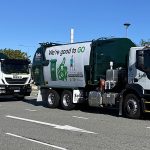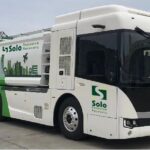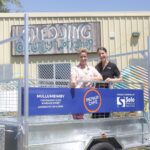Waste Management in Urban Environments: Addressing the Challenges of High-Density Living
Cities offer a host of diverse opportunities and experiences ranging from any choice of food delivery, shopping, and cultural experiences. When leaving an urban dwelling, you would very rarely return home single-handed; more likely you would be laden with shopping bags. Higher density living brings about a host of waste management challenges that demand innovative solutions. Here, we delve into the intricacies of waste management in urban environments and explore how Solo Resource Recovery is helping pave the way for a sustainable future.
The Urban Challenge
The allure of urban living is undeniable – with access to first-class amenities, entertainment and employment opportunities, just a few of the perks. However, the sheer volume of waste generated in densely populated cities can strain traditional waste disposal methods and infrastructure.
In Australia, high-density living is particularly pronounced in major cities, and with limited space for landfills and increased pressure on existing waste collection systems, there’s an urgent need to reimagine waste management practices.
The Complexity of Waste Streams
One of the most significant challenges in waste management within urban areas is the diversity of waste streams. In high-density living, residents often belong to different socio-economic backgrounds, cultural groups, and lifestyles. This diversity translates into a wide array of waste types, from organic kitchen waste to electronic waste and beyond. Effectively managing this diversity demands flexible and adaptive waste disposal solutions and resource recovery opportunities.
The Role of Solo Resource Recovery
With a deep commitment to sustainability, Solo offers a comprehensive range of waste collection, disposal, and recycling services designed to address the specific challenges of high-density living.
1. Tailored Solutions
One size does not fit all when it comes to waste management in urban areas. Solo Resource Recovery understands this and tailors its services to suit the unique needs of each community. Through advanced waste audits and analysis, Solo identifies waste patterns, enabling them to implement customised waste collection and disposal strategies. This targeted approach ensures optimal resource recovery and minimises the environmental impact.
2. Embracing Technology
Technology plays a crucial role in modern waste management, especially in densely populated areas. Solo Resource Recovery harnesses the power of data and smart technologies to optimise waste collection routes, reduce fuel consumption, and enhance overall efficiency. This not only saves costs but also reduces carbon emissions, contributing to a cleaner and greener urban environment.
Solo is also at the forefront of waste management innovation, and one such innovation that Solo is undertaking is the trial of a hydrogen powered waste collection vehicle. This is an opportunity to determine the suitability of hydrogen fuelled electric waste collection vehicles, and if appropriate, how a transition to them could be best achieved. The trial will be for an initial six-month period, and if deemed successful, the vehicles may be progressively deployed across Solo’s extensive Australia-wide network.
3. Community Engagement
Creating a sustainable waste management system requires the active participation of the community. Solo Resource Recovery fosters community engagement through educational programs and awareness campaigns, that address general waste separation, recycling tips and the value of organic materials (food and garden scraps).
4. Resource Recovery and Recycling
One of the cornerstones of sustainable waste management is resource recovery and recycling. Solo Resource Recovery works with state-of-the-art Material Recycling Facilities (MRFs) to maximise the recovery of valuable resources from waste streams. From paper and plastics to metals and electronics, Solo ensures that recyclable materials are diverted from landfills and reintroduced into the production cycle, reducing the demand for virgin resources.
5. Circular Economy Advocacy
Solo Resource Recovery is not merely a waste disposal company – innovation and vision is at the heart of our ethos. The principles of a circular economy are embedded into our daily operations, educational programs and long-term commitments and collaborations with a multitude of stakeholders. A circular economy is enacted in Solo’s efforts to recover quality recyclable materials for re-manufacturing. Solo’s Food Organics and Garden Organics (FOGO) services are an example of a closed-loop system, whereby valuable organic materials are taken to large scale industrial composting facilities and then redistributed back in to farms to enrich soil for sustainable food production.
Looking Ahead
As Australia’s urban landscape evolves, so must its waste management strategies. High-density living need not be synonymous with waste overburden and environmental degradation. Solo Resource Recovery is committed to a more sustainable urban future, where waste is treated as a resource, and communities work together to create cleaner, healthier cities.
Waste management in high-density urban environments is a multifaceted challenge that requires innovative solutions. Solo Resource Recovery has a history spanning over 90-years, with a wealth of experience in tailored waste management solutions for urban environments, technological advancements, community engagement and resource recovery.
As more businesses and organisations start to embed circular economy principles into their policies; Solo is proudly supporting and initiating sustainable practices to shape a better future for Australian cities.
Related Posts

Published: October 1, 2024
Is Your Waste Management Performance Up to Scratch? Discover the Solo Difference
Read more
Published: August 15, 2024
Solo Invests in the Future: Company Expands Fleet with Hydrogen Vehicles
Read more
Published: December 15, 2023